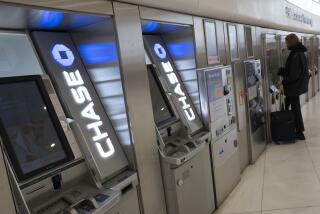B of A to Waive Customer Liability on Debit Cards
- Share via
Seeking to ensure the popularity of debit cards by eliminating a major consumer fear about them, Bank of America said Tuesday that it will take the unprecedented step of waiving customer liability for fraudulent use of the cards.
The immediate effect of B of A’s action is that 5.5-million debit cardholders--including 4 million in California--will no longer be held responsible for $50 or more when a thief steals and uses their debit cards, which make immediate payments from checking accounts.
But over the long run, industry executives said, more banks nationwide probably will follow B of A’s action for competitive reasons, ensuring that debit cards--and electronic banking--continue to play a greater role in the way consumers pay for goods.
“Consumer confidence in any payment system is of paramount importance,” said John Hall, a spokesman for the American Bankers Assn. in Washington. “If consumers don’t feel they can use the product, it won’t grow or be successful.”
B of A’s move came a week after MasterCard, the second-biggest issuer of debit cards after Visa, announced that it would limit consumer liability to $50 for unauthorized use of debit cards.
Debit cards, also called check cards, are like traditional ATM cards but with an extra feature: They allow a merchant to deduct money directly from a customer’s bank account by computer.
Unlike credit card losses, debit card loss due to fraud is extremely low, experts said, and banks sometimes informally waive the $50 liability. Nonetheless, consumer groups have increasingly raised concerns about the ease with which debit cards can be fraudulently used because, like credit cards, many require only a signature, not a security code. That has prompted banks to allay worries about a product that many think will someday replace checking accounts.
Debit cards and their use have proliferated in the last couple of years as banks have issued them as replacements for ATM cards. Banks have generated increasing fees from these cards and have found that they are cheaper to process than checks.
But consumer groups have complained that banks, including B of A, are issuing debit cards without fully explaining that they are different from credit cards. The legal limit for fraud loss on credit cards is $50. With debit cards, which are governed by different regulations, consumers can be held responsible for up to $50 only if they report the loss within two days of discovering it. If they don’t report it within two days, they can be potentially liable for all the fraudulent charges.
“We certainly applaud this move by B of A to protect consumers from fraud,” said Jon Golinger, of the California Public Interest Research Group, a consumer rights organization in San Francisco. “It’s a good step to protect consumers from risks they weren’t told about when they got it.”
About half of B of A’s checking-account holders now have debit cards. The bank said its fraud-loss waiver also covers its ATM cards.
B of A’s debit card, which was introduced in late 1995, carries the Visa logo. Visa officials were not available for comment on B of A’s action, but experts said Visa is expected soon to match MasterCard’s $50 cap on fraud loss for debit cardholders.
B of A, in taking a step further by waiving all liability, said it wanted to ensure that its customers were comfortable about carrying debit cards around. “We want our customers to enjoy all of the benefits associated with this popular card option with peace of mind,” said Gene Lockhart, president of B of A’s Global Retail Bank.
MasterCard said that debit cards with its logo on them numbered 16.5 million nationwide in the first quarter--up 79% from a year earlier. And transactions made with those cards have doubled during that one-year period, to 252 million sales totaling $10.1 billion in the first three months of this year.
“The trend is moving away from cash and check into this more convenient and popular product,” said Roy Clason, a MasterCard spokesman.
Among banks that issue debit cards with a MasterCard logo on them is Wells Fargo, which has 2.1 million customers with such cards.
Wells and other banks in California said they would study B of A’s move but declined to comment further. “Wells is also concerned about the debit card liability issue and we are reviewing our options,” said Kathy Shilkret, a company spokeswoman.
B of A declined to say how much debit card fraud it has seen or what it may now cost the bank to cover all losses. But industry executives said it would not be expensive to B of A.
“If there were a massive debit card fraud problem, they would probably not be extending such a broad limit of liability,” said John Stafford, a spokesman for the California Bankers Assn. “I think this has more to do with market forces. It ensures the continued popularity of the debit card.”
More to Read
Inside the business of entertainment
The Wide Shot brings you news, analysis and insights on everything from streaming wars to production — and what it all means for the future.
You may occasionally receive promotional content from the Los Angeles Times.











